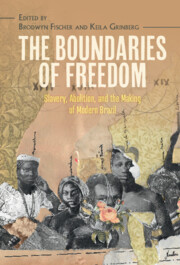Book contents
- The Boundaries of Freedom
- Afro-Latin America
- The Boundaries of Freedom
- Copyright page
- Contents
- Figures
- Tables
- Acknowledgments
- Introduction Slavery and Freedom in Nineteenth-Century Brazil
- Part I Law, Precarity, and Affective Economies during Brazil’s Slave Empire
- Part II Bounded Emancipations
- Part III Racial Silence and Black Intellectual Subjectivities
- Part IV Afterlives of Slavery, Afterwards of Abolition
- 13 The Past Was Black
- 14 From Crias da Casa to Filhos de Criação
- 15 Slave Songs and Racism in the Post-Abolition Americas
- Bibliography
- Index
13 - The Past Was Black
Modesto Brocos, The Redemption of Ham, and Brazilian Slavery
from Part IV - Afterlives of Slavery, Afterwards of Abolition
- The Boundaries of Freedom
- Afro-Latin America
- The Boundaries of Freedom
- Copyright page
- Contents
- Figures
- Tables
- Acknowledgments
- Introduction Slavery and Freedom in Nineteenth-Century Brazil
- Part I Law, Precarity, and Affective Economies during Brazil’s Slave Empire
- Part II Bounded Emancipations
- Part III Racial Silence and Black Intellectual Subjectivities
- Part IV Afterlives of Slavery, Afterwards of Abolition
- 13 The Past Was Black
- 14 From Crias da Casa to Filhos de Criação
- 15 Slave Songs and Racism in the Post-Abolition Americas
- Bibliography
- Index
Summary
This chapter provides a reinterpretation of Modesto Brocos’ well-known painting, Redenção de Cã. Its goal is to resituate the notorious canvas within the complex transitions from bondage to freedom that began in the 1870s and lingered through the 1910s. It argues that Redenção is a painting just as much about a black nineteenth-century emancipationist past as it is about a whitened twentieth-century post-emancipation future. This argument calls into question previous interpretations that have been reluctant to interrogate what is to be made of the Black characters in the canvas and how Brocos – whose contact with Afro-Brazilians began in the 1870s, during his student years, and intensified after 1890 – drew from direct contact with the formerly enslaved to paint his enigmatic portrait of bondage redeemed.
Keywords
- Type
- Chapter
- Information
- The Boundaries of FreedomSlavery, Abolition, and the Making of Modern Brazil, pp. 341 - 367Publisher: Cambridge University PressPrint publication year: 2022

